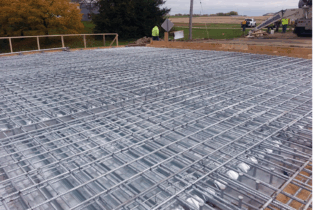As economic recovery slowly picks up, and the industry waits to see whether government’s ambitious infrastructure-led recovery materialises, it’s never been more important for contractors to ensure they are fighting fit and best positioned to take advantage of every opportunity that comes their way.
By Christiaan Steyn, MiWay Head of Business Insurance
An essential first step is to identify and prioritise the risks they face and put strategies in place to mitigate them. Contractors face a broad span of risks, some of which are beyond their control. These risks include late or non-payment by principal contractors and/ or state entities, accidents on site or in transit, safety concerns, to name just a few. The tough conditions in the sector have also seen many of the larger contractors go into business rescue. A particularly severe risk, relates to the growing practice of the hijacking of construction sites by so-called community organisations, also known as construction mafia. These criminals shut down construction sites until they are paid protection money or local organisations are used as suppliers. Another key risk is the impact of Covid-19 lockdown regulations on the industry. Contractors need to spend time assessing the nature and severity of the risks within their control, and then put strategies in place to mitigate them. As they face up to a threatening risk landscape, it is important to find out what services are available through their insurer. Comprehensive business insurance can assist with mitigating many common risks. Business insurance products include: Liability insurance This covers the insured that is legally liable to pay damages to third parties, as a result of incident which occurred in the normal course of business. Given that construction sites are notoriously dangerous places, liability insurance can cover the risk of a site visitor, for example, being injured on site based on the cover chosen by the client.Vehicle insurance, including special-purpose vehicles
Contractors, small and large, are hugely dependent on their vehicles to run their businesses on a day-to-day basis and thus to fulfil their contractual obligations. Insurance can be bought to cover all types of vehicles used in business, from bakkies and trailers to specialised plant and equipment, such as dump trucks and “yellow metal” vehicles. Check if your insurer offers a wide range of optional extras when it comes to standard vehicles, including towing, cover for driver dishonesty and emergency medical costs for passengers. Business property and equipment insurance. Although work is done on various sites,most contractors have properties where they have offices and store equipment. The extent of coverage will differ from insurer to insurer and it is important to understand which risks the business is still exposed to. As an example, damage to equipment as a result of load shedding will not necessarily be covered by all insurers. Business interruption insurance This cover can help compensate businesses for the financial losses suffered due to an interruption in business (for example, a natural disaster or fire at your business premises). A great advantage is that MiWay offers all new clients business interruption cover at no additional cost on non-motor policies. For example, if you insure your business equipment (like printers or machinery) with us and something should happen to it, causing a loss of income, you will enjoy Business Interruption cover. This benefit is for fixed expenses that you continue to incur despite the loss in income. However, these common forms of business insurance overs can be extended to suit the individual needs of each business – most insurers offer a variety of other forms of business cover that might be valuable to contractors, for example cover against stock loss and employee dishonesty. Contractors should also consult with their insurer or broker to see whether any of the additional services offered to policyholders would be useful in mitigating their particular risk profiles. While contractors do face a daunting array of risks, there are many ways to mitigate them easily through easy-to-understand insurance cover. Contractors should also use their insurer as a resource for helping them understand their risks and what can be done to reduce them.






